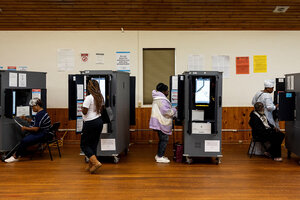In Georgia, women turn out to vote in force on Election Day. Why that matters.
In Georgia, most voters cast their ballots early, and women accounted for 55% of those votes. Does that favor Kamala Harris?

People vote during the 2024 U.S. presidential election on Election Day, at a community center in College Park, Georgia, Nov. 5.
Eloisa Lopez/Reuters
Baldwin County, Georgia
In a campaign marked by high interest – and anxiety – millions of Americans cast their ballots before Election Day. And a majority of those early voters, at least in states that track by gender, were women.
In the states that report gender data for votes cast, 54% of early votes have been by women versus 44% by men. That may be good news for the Democratic nominee, Vice President Kamala Harris, who fares far better in polls among women than among men.
In Georgia, one of seven key battlegrounds in this election, women accounted for 55% of the massive early vote, to 45% for men, according to the Georgia secretary of state’s office. Some political experts see that edge as an indicator of strength for Democratic presidential nominee Kamala Harris, whose support runs much stronger with women than men in general.
Only tonight’s vote counting will tell, of course, if that trend helps win the state for Vice President Harris.
Early voting wasn’t quite as big this year as in 2020 during the pandemic. But it was big enough that in the Peach State, today might be called an Election Day lite.
Over 4 million people had already voted before today, according to Georgia Secretary of State Brad Raffensperger. That left only 1.5 million to 2 million people left to vote on Election Day itself.
Ms. Harris may have a good shot at following in President Biden’s footsteps and winning Georgia. There are more active women voters than men in Georgia.
Mr. Trump’s hopes in this state lie with mobilizing “young good old boys who usually don’t vote,’’ says Charles Bullock, a veteran political scientist at the University of Georgia, in Athens.
The big nationwide gender gap may in part reflect this cycle’s focus on abortion rights, following the 2022 overturning of Roe v. Wade. Another factor could be the Trump campaign’s emphasis on hypermasculinity in its pitch to voters.
Allison Richardson, a psychology major at Georgia College & State University in Milledgeville, Georgia, says she usually stays as far away from politics as she can. “We argue too much as a country as it is,” she says.
But despite seeing “two pretty bad choices” in this year’s presidential election, Ms. Richardson took the time to file an absentee ballot early for Kamala Harris.
Ms. Richardson, who hails from Spalding, Georgia, leans Democratic – her first ballot was cast for Sen. Raphael Warnock in 2022. She is torn on abortion rights. She says Georgia’s six-week limit on abortion is “too strict – someone might not even know they’re pregnant at that point.” But she also says states, under the federalist system, should have the right to decide their own rules around such critical issues.
In the end, it was less hot-button issues and more a sense of agency that drove her to vote.
“I have the right to vote, so I will, and given that this is a very close election I felt it as important that I should,” she says.
Not far away, outside an apartment building bedecked with Trump signs, potential Trump voter Nick Humphrey of Alpharetta, Georgia, is literally staying on the couch.
The 18-year-old is eligible to vote. He considers himself “right-wing,” – like many of his neighbors at the fraternity-like complex, with well-worn couches on the front porch he fits the Joe Rogan demographic. But despite podcaster Mr. Rogan’s endorsement of Mr. Trump, Mr. Humphrey, a marketing major, doesn’t plan to head out. With just two hours until polls close, he shakes his head. “Ain’t gonna happen,” he says.
He believes Mr. Trump is going to win Georgia, regardless of whether he casts a vote – a result he’d welcome.
“I just think I’ll be better off economically with a Trump presidency,” he says. “At this rate, when I graduate, I might as well give up on ever being able to buy a house.” Ms. Harris’ plan to help first-time homeowners with down payments is a pipe dream and too costly, he says. It’ll only drive up prices. And abortion? It’s already been settled by the Supreme Court.
The two young Georgians can’t be seen as representative. Yet their views and decisions in this battleground state could well play into who emerges victorious once the votes are counted.
Staff writer Linda Feldmann contributed to this report.

